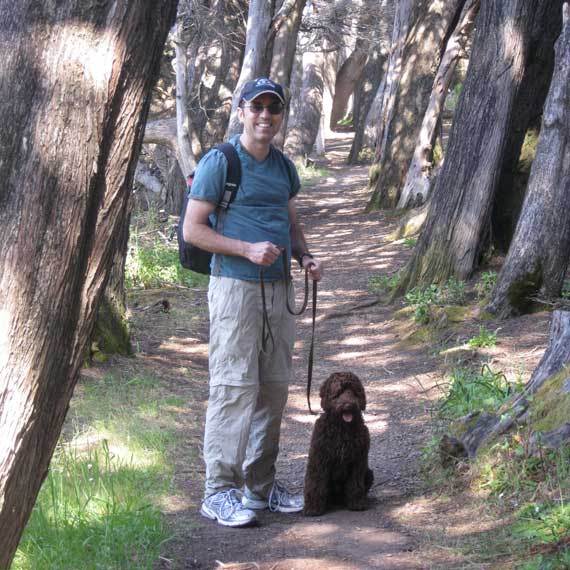One sunny afternoon early this month, I took my dog Cooper for a walk around the meadow behind my wife's and my home. As Cooper and I followed the trail, I sank into reverie. I would attend an intimate fundraising dinner for presidential candidate Hillary Clinton that evening, and thoughts of what questions I could possibly ask her ricocheted in my mind. Within minutes, the temptation to pull out my smartphone and take down some reminders was almost too hard to resist. I became aware again of the familiar restless feeling I get when self-absorbed, like something prickly had dug into my soul and needed to be appeased so that I could be at peace again. I tugged at Cooper's taut leash -- he had stopped to sniff at a trailside bush.
At that moment it occurred to me that I was on that walk for some quality time with Cooper, one of my favorite beings in the world, and that he deserved my patience. I realized again, suddenly, that part of my own purpose in life was to improve life for others. I felt like the sun had emerged from behind a cloud.
My ongoing struggle to make altruism a part of my moment-to-moment awareness started a long time ago.
In the summer of 1990, when I was diagnosed with schizophrenia, the "unfairness" hit me like a fastball to the noggin. I felt outrage at my first psychiatrist for telling me I had had a psychotic break and resented my parents' insistence that I take my side-effect-ridden medication. Deeply doubtful about what future might be left for me when I was unable to return to college when fall returned, I sank into a dangerous self-absorption.
What pulled me out of that near-suicidal funk was resuming my involvement in the community around me. Fascinated with anthropology (it was my secondary college major), I volunteered to study chimpanzees at the Oakland Zoo. Recording the chimps' so-close-to-human behaviors was fun and gave me a sense of purpose -- I was contributing to science. After a few months of this work, while in treatment, I had recovered enough to return to school and to life. Especially as someone with serious mental illness, I was so fortunate that my capacity to care about the world re-emerged when it did.
Over time, I have gradually realized that one of the best ways I can contribute to the world's well-being is to advocate for a better mental health care system. As a leading cause of adult disability, psychiatric conditions afflicted almost 44 million American adults in 2013. According to a study published Nov. 2 by 2015 Nobel Prize winner Angus Deaton and Anne Case, the death rate for middle-aged white Americans is climbing for the first time in recorded history -- apparently due to increasing suicides and drug overdoses. I feel very fortunate now to work as communications director and board member of my family's nonprofit for brain health research -- One Mind Institute -- raising awareness for this meaningful cause, and hearing from people my and my family's work has benefited always helps me feel worthy.
At that fundraising dinner for Hillary Clinton's campaign, Secretary Clinton seemed dedicated, down to earth, and interested in my family's and my opinions, particularly on how to improve brain health in this country. When I described the potential of smartphone-delivered therapies to reach more people in need and to improve brain skills like attention, memory and motivation, she listened receptively. She said that she was encouraged to hear of the progress in this area because it meant there were even more ways to supplement or sometimes even supplant drug treatment for mental health conditions. She asked to work with my family to learn more. Seeing that my words might have sparked a potentially positive process made the late evening totally worthwhile for me.
After talking with Secretary Clinton, I feel even more inspired to care for the people of this country. I still feel dismay when I think that so many Americans, as I am, seem at risk to succumb to self-absorption. I shudder to think of what might happen to the American people if the stresses of the competitive, time-starved, instant-gratification culture to which we are exposed daily get the better of us. But I believe that constructive change is possible when we recognize that we all share this world, with all its angst and its wonder.
Do you ever feel so stressed that you want to burn bridges to reality? Once, I considered that, and decided that's not for me. Need inspiration? Take someone you know, and do something kind for them. It can be as easy as a holding a door open, or patiently listening when someone describes a hard day. Or, donate or volunteer for a cause you care about. By giving of yourself to the world and the people in it, you can inspire yourself to greater emotional health.
To learn more about the science behind how altruism can improve personal emotional strength, see the website of the A2A Alliance.
___________________
If you -- or someone you know -- need help, please call 1-800-273-8255 for the National Suicide Prevention Lifeline. If you are outside of the U.S., please visit the International Association for Suicide Prevention for a database of international resources.
